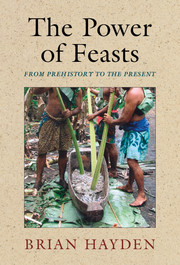Book contents
- Frontmatter
- Contents
- List of Figures
- Acknowledgments
- 1 Before the Feast
- 2 Food Sharing and the Primate Origins of Feasting
- 3 Simple Hunter/Gatherers
- 4 Transegalitarian Hunter/Gatherers
- 5 Domesticating Plants and Animals for Feasts
- 6 The Horticultural Explosion
- 7 Chiefs Up the Ante
- 8 Feasting in Early States and Empires
- 9 Industrial Feasting
- References Cited
- Index
9 - Industrial Feasting
Published online by Cambridge University Press: 05 October 2014
- Frontmatter
- Contents
- List of Figures
- Acknowledgments
- 1 Before the Feast
- 2 Food Sharing and the Primate Origins of Feasting
- 3 Simple Hunter/Gatherers
- 4 Transegalitarian Hunter/Gatherers
- 5 Domesticating Plants and Animals for Feasts
- 6 The Horticultural Explosion
- 7 Chiefs Up the Ante
- 8 Feasting in Early States and Empires
- 9 Industrial Feasting
- References Cited
- Index
Summary
By any reckoning this was probably the most important event in world history … since the invention of agriculture and cities.
– Hobsbawm 1962:29Indeed, the Industrial Revolution was an earth-shaking development for human cultures. As Hobsbawm notes, it was a revolution in the true sense of the word. It completely transformed almost every aspect of society and environment from economics to education, ideology, politics, family relations, religions, and, of course, feasting. The first signs of change began to appear in Britain, and slightly later in Europe, in the 1780s, attaining a significant influence on society and governments by the 1840s with the building of the railways and construction of massive heavy industry in Britain. After this time, revolutionary changes in society became a constant feature of life continuing into the present with nuclear and computer developments.
Prior to the Industrial Revolution, no previous society had been able to break through the productive barrier created by traditional technology, transport, and social structures. Slave-based empires were the maximum expression of political and cultural complexity that could be achieved, and these summits of achievement stretched capabilities to the limit; they were anything but stable. They generally collapsed after only a few hundred years of existence. What the Industrial Revolution achieved for the first time in human history was a seemingly unlimited ability to produce goods, services, and manpower (in machine form) on a constant around-the-clock output basis, coupled with a voracious ability to find, develop, and use new resources. Profit became the dominant credo, and no amount of human suffering deterred its pursuit until Luddite saboteurs and others began to destroy the means of production and tried to overturn the ruling order. Some of the most serious consequences of the Industrial Revolution were social (Hobsbawm 1962:38). Rural families were driven off their lands for new agribusinesses and to provide cheap and mobile labor for the new factories. Families that had provided mutual assistance in agricultural villages were divided and scattered.
- Type
- Chapter
- Information
- The Power of FeastsFrom Prehistory to the Present, pp. 347 - 372Publisher: Cambridge University PressPrint publication year: 2014



